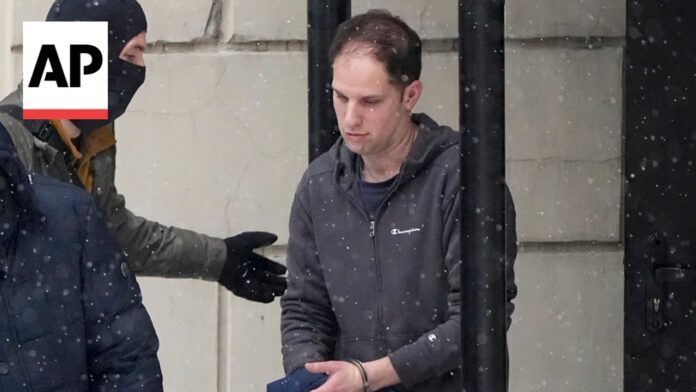Evan Gershkovich, a Wall Street Journal reporter, faces a secret trial in Russia after 15 months in prison on espionage charges without public evidence
Evan Gershkovich, a seasoned reporter for The Wall Street Journal, finds himself at the heart of a geopolitical storm as he faces trial in Russia, accused of espionage without any public evidence to substantiate the charges. Detained in Moscow’s Lefortovo prison for over 15 months, Gershkovich has endured solitary confinement, permitted only one hour of outdoor exercise daily, and sustained his spirits through reading Russian classics like Tolstoy’s “War and Peace.”
Born to Soviet émigré parents and raised in New Jersey, Gershkovich, 32, established himself as a respected journalist covering Russia, admired by colleagues for his deep understanding of the country and commitment to fair reporting. His arrest in Yekaterinburg in March 2023 sent shockwaves through international media circles, prompting widespread condemnation from press freedom advocates and diplomatic quarters.
The trial, scheduled to begin in Yekaterinburg amid secrecy and strict controls over information dissemination, reflects Russia’s contentious stance on perceived foreign interference and espionage. Critics, including The Wall Street Journal’s publisher Almar Latour, have denounced the trial as a “sham” based on fabricated charges, highlighting the Kremlin’s influence over judicial proceedings.
In response to mounting international pressure, including calls for Gershkovich’s release from the U.S. State Department and global media organizations, Russia has hinted at a potential prisoner swap involving Gershkovich. Such exchanges have precedent, with recent swaps involving Americans detained in Russia and Russians imprisoned in the United States, underscoring the geopolitical bargaining at play.
Gershkovich’s ordeal symbolizes the deteriorating conditions for journalists in Russia, exacerbated by stringent laws and crackdowns on independent media amidst heightened geopolitical tensions, particularly since Russia’s invasion of Ukraine. His case has become a focal point in debates about press freedom and the treatment of foreign correspondents operating in politically sensitive regions.
Analysis:
Political Perspective: The secret trial of Evan Gershkovich underscores Russia’s use of judicial proceedings as a tool for diplomatic leverage and internal control. By denying transparency and due process, Moscow reinforces its authority over perceived threats while signalling readiness for diplomatic negotiations with Western counterparts.
Social Perspective: Gershkovich’s detention highlights the risks journalists face globally, particularly in authoritarian regimes where reporting on sensitive issues can lead to severe consequences. His case amplifies concerns about press freedom and the chilling effect on investigative journalism under repressive regimes.
Racial Perspective: While not explicitly racial, Gershkovich’s background as a U.S. citizen of Soviet descent may influence perceptions of his treatment within Russia’s judicial system, potentially shaping international discourse on identity and national affiliation in cases of political persecution.
Gender Perspective: Gender dynamics are not central to Gershkovich’s case, yet his imprisonment raises broader questions about safety and support for journalists regardless of gender, especially in environments hostile to press freedom.
Economic Perspective: Evan Gershkovich’s trial intersects with economic interests, reflecting broader geopolitical strategies involving Russia’s negotiations with Western nations. The potential for a prisoner swap highlights the economic and diplomatic stakes involved in resolving high-profile legal disputes.
